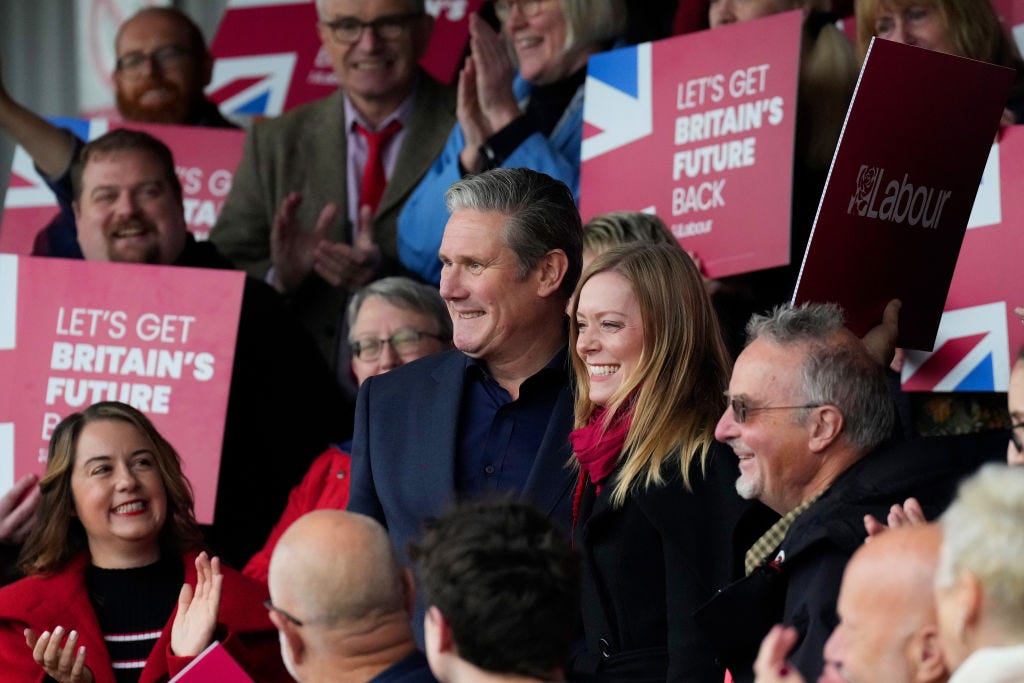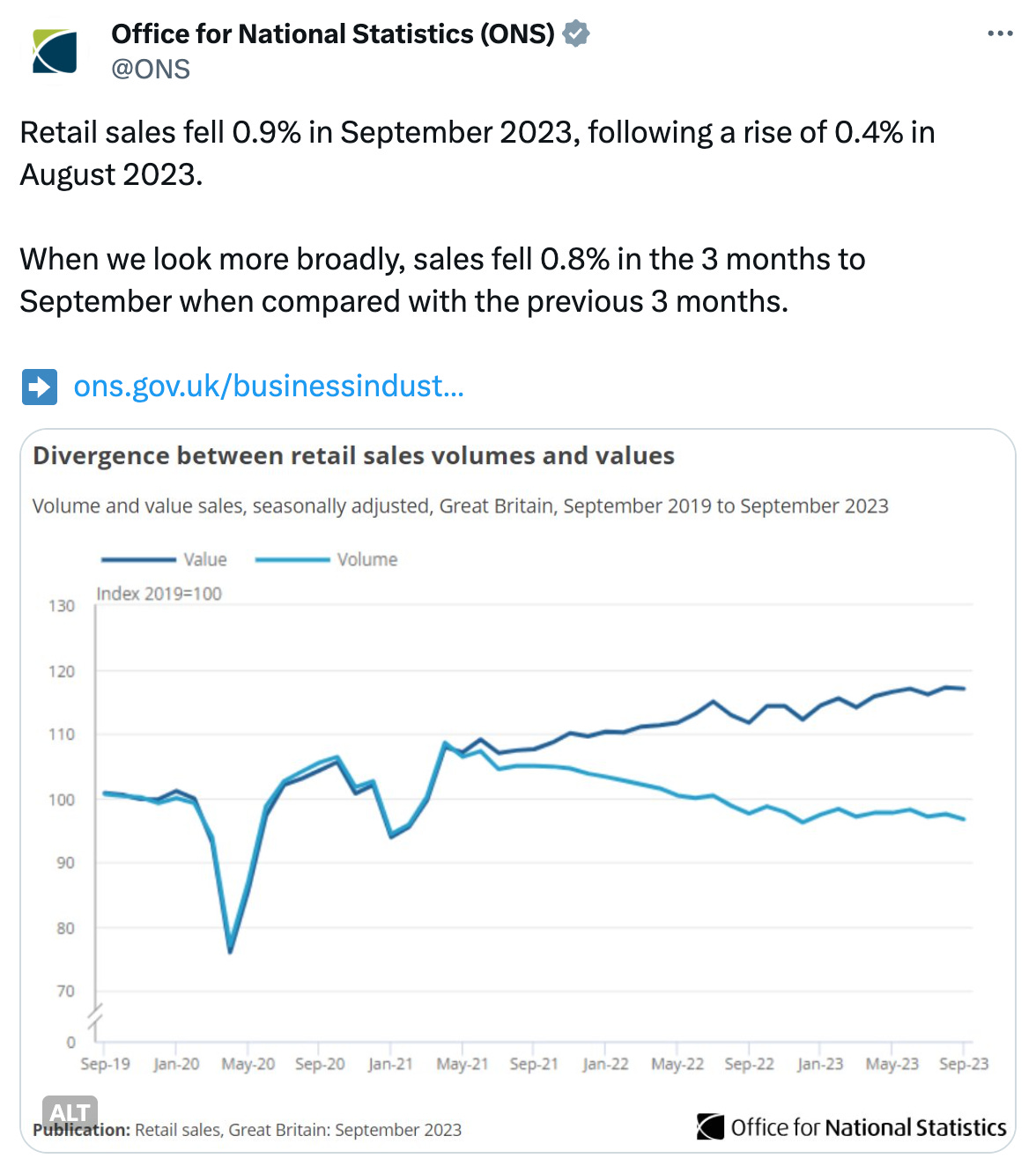A scheduling note: Off to Lunch is now going to take a two-week break as we work on the future of the newsletter, our Business Studies podcast and Business Leader. More details below…
The Conservative government suffered two significant by-election defeats to Labour overnight and there is economic data out today that demonstrates why voters are frustrated with the status-quo.
Labour overturned a majority of nearly 20,000 to win the by-election in Tamworth, Staffordshire (the new MP Sarah Edwards is pictured above with Labour leader Sir Keir Starmer) and it overturned a majority of almost 25,000 to win in Mid-Bedfordshire.
I will leave others to comment on the political significance of those votes (you can check-out an analysis by legendary pollster Sir John Curtice here) but new figures on the economy provide an interesting backdrop.
Consumer confidence in the UK has fallen by the most in three years, according to the latest survey by GfK. This survey measures how households feel about their own finances and the economy, and is closely watched by the Bank of England and economists.
The GfK consumer confidence index has fallen by nine points month-on-month to -30 for October. That is the largest monthly fall since March 2020, the month that the government introduced the first Covid-19 lockdown.
The drop in consumer confidence is a sign of how the cost-of-living crisis is still squeezing households and how a rise in mortgage rates is only just feeding through to some families.
Joe Staton, client strategy director, at GfK, said:
“The timing of the sharp drop in our major purchase measure – down 14 points – will concern retailers across the land in the run-up to Christmas. The volatility we are seeing in consumer confidence is a sure sign of a depressed economic mood and there’s no immediate prospect of any improvement.”
The graph below shows how the consumer confidence index has moved over the last year. The good news is that confidence is still higher than it was at the end of 2022, although it is still deep in negative territory…
Other data out today from the Office for National Statistics shows that retail sales fell last month. The volume of sales in September dropped by 0.9 per cent compared to August and 1 per cent compared to the same month last year. Economists had expected sales to fall by 0.2 per cent month-by-month, according to a consensus compiled by Reuters. The larger-than-expected drop is partly linked to warm weather during the month. You can find the data below…
Other stories that matter…
1. A fascinating piece by the Financial Times on the future of the UK countryside, particularly the tension between using it to produce food and using it to hit net-zero targets by planting trees. Feature here
2. The tech giants in Silicon Valley are reducing the importance of news on their platforms, including Google, Facebook and Twitter. This is making it harder for media groups to drive online traffic from these sites. The New York Times has done a big feature on the rift between Silicon Valley and the media here. On a similar note, The New Yorker says that the Israel-Hamas war has demonstrated that social media sites have “abdicated responsibility” on news - you can read more here - while statistician Nate Silver says that muddled reporting of the explosion at a hospital in Gaza City by the New York Times shows the challenges of focusing on breaking or live news - you can read his piece here
3. The boom is over for the venture capital industry and it needs to adapt to a world where money is more expensive (due to higher interest rates) therefore generating cash and profit is more important than growing revenues. That is according to John Thornhill, the founder of start-up website Sifted, in his latest column for the Financial Times. You can read that piece here. On a similar note, new research suggests that more than half of the venture capital teams set-up by large companies to invest in promising start-ups have not had a single exit - ie sold their stake - in the last 12 months. You can read more from Fortune here
4. We may be overrating and misunderstanding the importance of luck in the success of individuals and businesses, according to the latest Bartleby column in The Economist. “Just as some people blindly believe that merit determines success, so it is possible to get too hung up on the role of chance,” it says. “Better technology and greater expertise reduce the role of chance; the average success rates in oil exploration, for example, have gone up over time.” You can read the column here
5. Every entrepreneur needs an exit plan - whether that is a sale or retirement - and your business must be able to activate it quickly, according to a piece by Entrepreneur magazine here
And finally…
As I mentioned above, Off to Lunch is now going to take a two-week break as we work on the future plans for the newsletter, Business Studies, and Business Leader, and how they will come together. There will be some news on job opportunities coming next week, so keep your eyes open for that. I can’t wait to share more details of the exciting plans with you soon…
Thanks for reading. If you enjoy Off to Lunch then please share it with others and spread the word. If this newsletter was shared with you then please sign-up below to become a member, get Off to Lunch sent directly to your inbox, and contribute to the work of Off to Lunch
Best
Graham







